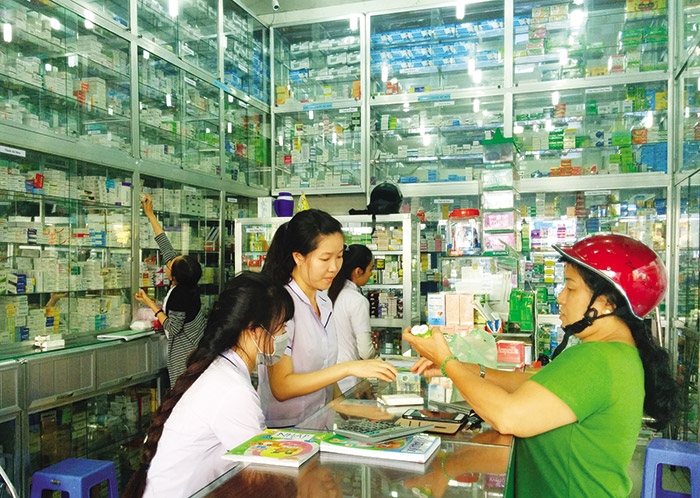Decree opens up pharma competition
 |
| New legislation means procedures have been relaxed in terms of drug imports, which could lead to foreign companies reaping the benefits, Photo: Le Toan |
Late last week the Ministry of Health (MoH) officially introduced Decree No.155/2018/ND-CP, amending a number of regulations on the business conditions that pharmaceutical and cosmetics companies faced under the controversial Decree No.54/2017/ND-CP.
“Decree 155 has many positive changes towards cutting procedures, thus creating favourable conditions for businesses in tenders, drug imports, and others,” said Truong Quoc Cuong, Deputy Minister of Health.
One of the important features of the move is the cut in the number of procedures in pharmaceutical imports which had attracted concern among international pharmaceutical companies. In terms of licensing the import of drugs without a circulation registration paper, the new decree requires label models and drug descriptions in the country of manufacturing or country of export, except for cases with a certificate of pharmaceutical product (CPP).
| " The decree includes many positive changes towards cutting procedures, thus creating more favourable conditions for businesses. " – Truong Quoc Cuong Deputy Minister of Health |
This requirement is simpler than those set out by the previous decree which asks for label models and descriptions of drugs being actively marketed in the countries producing the CPP, except for cases with the CPP.
Furthermore, importers are exempted from the Good Manufacturing Practice (GMP) certificate under Decree 155 if manufacturing facilities have been recognised to have met the GMP or the CPP. In contrast, the old decree asks importers to have the GMP certificate of all manufacturing facilities if the proposed imported drugs were produced by from many units.
In regard to clinical records of proposed imported drugs, under the new legislation, importers are exempted from clinical records for the pharmaceuticals that were once licensed to import through the same import mode as regulated in the decree. The exemption is allowed as long as no changes were made in relation to information about indications, dosage, and instruction for use. This is in contrast to Decree 54 where importers had to submit clinical records for proposed drugs as regulated by the MoH.
According to a representative from the MoH’s Drug Administration of Vietnam, the new decree also eases the criteria to consider the volume of imported drugs.
Article 5 of the decree states that the number of imported pharmaceuticals is based entirely on the demands of the importers. While the grounds for the import volume ruled in Article 91 is dependent on the scale and development of fatal diseases, dangerous, and emerging epidemics.
Another positive change in is drug registration working towards reducing the time to appraise the manufacturing facilities in terms of review, recognition, and appraisal of dossiers. In particular, the time for dossier appraisal will be cut to 40 days, rather than the 60 days stated by Decree 54 and to 20 days for dossier recognition from 30 days as regulated by Decree 54.
The implementation process of the legislation will be extended to January 1, 2021 for manufacturing facilities and materials for drug production, while the process will be extended to June 30 this year for drug trading units.
Drug registration and drug imports to Vietnam have been among the top concerns for international pharmaceutical firms from the EU and ASEAN for years. Many have complained that regulations in Decree 54 have caused difficulties for their operations and put up barriers to improving patient access.
With the new decree, many of these concerns have been addressed, thus creating more favourable conditions for businesses to practice imports.
In spite of the improvements, industry insiders have raised concerns about the possibilities of pharmaceuticals imports to Vietnam increasing. It is thought that foreign companies could take advantage of the loose rules to cash in on the country’s growing demands amid an increase in diseases, especially non-communicable diseases (NCDs). According to global healthcare company Norvatis, NCDs account for over 70 per cent of the total incidences of diseases and health-related deaths in Vietnam.
In the meantime, domestic and international drug makers are expanding local production to reap the incentives from the country’s plan to prioritise domestically-produced pharmaceuticals.
With a possible increase in the volume of drug imports and a growing volume of locally-made pharmaceuticals, new competition in the local market will begin to take shape.
What the stars mean:
★ Poor ★ ★ Promising ★★★ Good ★★★★ Very good ★★★★★ Exceptional
 Tag:
Tag:
Related Contents
Latest News
More News
- Kurz Vietnam expands Gia Lai factory (February 27, 2026 | 16:37)
- SK Innovation-led consortium wins $2.3 billion LNG project in Nghe An (February 25, 2026 | 07:56)
- THACO opens $70 million manufacturing complex in Danang (February 25, 2026 | 07:54)
- Phu Quoc International Airport expansion approved to meet rising demand (February 24, 2026 | 10:00)
- Bac Giang International Logistics Centre faces land clearance barrier (February 24, 2026 | 08:00)
- Bright prospects abound in European investment (February 19, 2026 | 20:27)
- Internal strengths attest to commitment to progress (February 19, 2026 | 20:13)
- Vietnam, New Zealand seek level-up in ties (February 19, 2026 | 18:06)
- Untapped potential in relations with Indonesia (February 19, 2026 | 17:56)
- German strengths match Vietnamese aspirations (February 19, 2026 | 17:40)






















 Mobile Version
Mobile Version